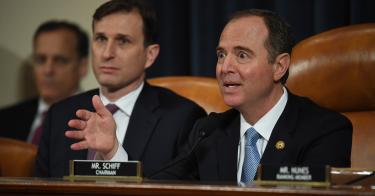The first public hearing in the impeachment investigation of President Trump produced more heat than light.
House Democrats claim this impeachment process is identical to that used for Presidents Bill Clinton and Richard Nixon. This is a whopper, even for politicians. Take subpoena authority, one of the most important tools of any investigation. For Clinton and Nixon, the majority and minority had equal authority; if the other side did not cooperate, each could get permission from the committee. Today, the majority can subpoena unilaterally, but the minority must always get permission. One of these impeachments is not like the others.
Several things became apparent today. First, we saw why Democrats chose not to follow the less-partisan process used in past impeachments. Republicans asked Chairman Adam Schiff, D-California, when their request for the “whistleblower” to testify would be granted. He responded that they could later make a motion that the committee would decide. If you think Schiff’s committee will grant that request, I have some oceanfront property in Oklahoma to sell you.
Second, the opening statements by Schiff and Rep. Devin Nunes, R-California, the committee’s ranking member, made clear their approach. Schiff and the Democrats say that Trump is guilty of “bribery” or even “extortion” by withholding foreign aid until the president of Ukraine promised to help him get reelected. Nunes and the Republicans challenge the Democrats’ credibility and their interpretation of whatever facts can be established.
Third, Democrats appear to have shifted to “bribery” or even “a shakedown scheme” because “quid pro quo” wasn’t getting traction. After all, according to Merriam-Webster, a quid pro quo is “something given or received for something else.” That sounds like what happened when I stopped at the gas station this morning. In this respect, foreign policy is no different than any other dimension of public or private life: It’s full of quid pro quos, it’s how everything happens.
Fourth, it appears Schiff will actively try not only to establish a particular impeachment narrative, but to steer witnesses away from testimony that might undermine that narrative. During Republican questioning, Schiff interrupted to tell the witnesses that they should avoid answering questions based on “facts not in evidence.” The basis for this admonition is a complete mystery.
If there’s one thing about impeachment on which everyone agrees, it’s that this process is not like the criminal justice process. The Federal Rules of Evidence do not apply, any House or Senate member may use whatever standard of proof they wish, and conduct does not have to be criminal to be impeachable. If Schiff was held to this standard, his opening statement would have been little more than reading the witnesses’ biographies.
Finally, just as the complaint filed in August by the “whistleblower” lacked first-hand information, the testimony today lacked any concrete, direct evidence of the “bribery” or “shakedown” on which Democrats appear to be hanging their impeachment hopes. The witnesses referred to their impressions, speculations, and opinions. They related what others had told them — or that others had told others who then told them — as well as their understandings and assumptions.
At the end of the day, the question is whether the evidence shows misconduct so egregious that the president should be removed from office now. It’s whether he has committed offenses that injure our very system of government so seriously that the public should not be allowed to pass judgment in the next election.
Impeachment is a legitimate part of our constitutional order, but it short-circuits the centerpiece of our system of government, the people’s ability to choose their own leaders.
This piece originally appeared on Washington Examiner on 11/13/19



